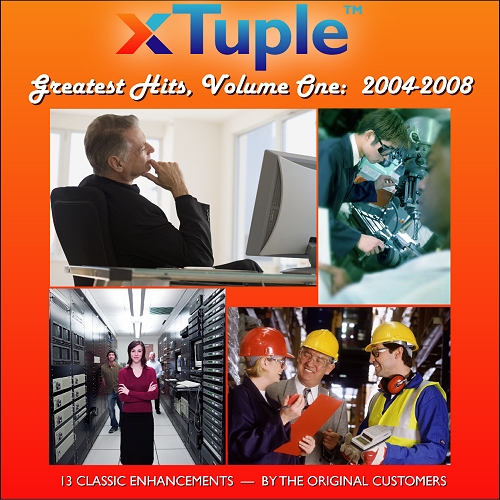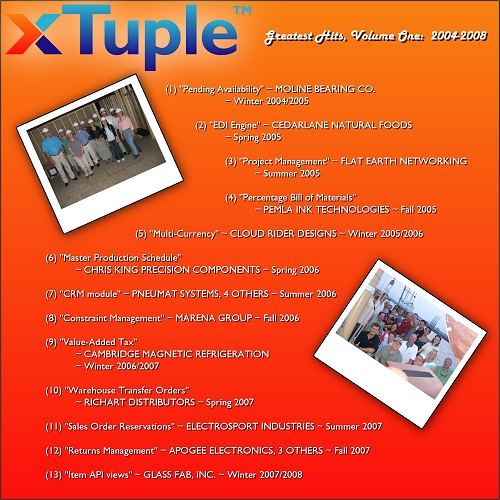NORFOLK, VA
Powered by 13 major customer enhancements, leading open source ERP now comes in Standard (now Distribution), PostBooks®, and Manufacturing Editions
xTuple, the leader in open source enterprise resource planning software, announced an expansion of its award winning line of products, and celebrated the new release with a tongue-in-cheek collection of its customers' "Greatest Hits."

The company highlighted thirteen major enhancements to xTuple ERP over the past few years which have powered the exponential growth of the product, each of which were contributed or sponsored by different customers. Partly as a result of that growth, xTuple ERP is now available in three Editions for different types of users:
- xTuple ERP PostBooks® Edition is the entry-level offering, available completely free and open source, and suitable for small businesses of all kinds. It includes full financials; robust CRM; Sales and Purchasing; financial and ad-hoc reporting; and lightweight inventory, manufacturing and distribution.
- xTuple ERP Standard Edition (now Distribution), the newest product, is a midrange commercial offering, which adds advanced inventory control, warehousing, and other features to the core package. It's a great option for distributors, retailers, light manufacturers, and anyone else who would prefer commercially licensed software.
- xTuple ERP OpenMFG Edition (now Manufacturing) is the premium commercial offering, and is recommended for manufacturing companies in both discrete and batch process production; make to order, make to stock, or mixed-mode; even job shops and engineer-to-order.
In celebration of the new xTuple ERP Standard Edition, and the continuing growth of all three products, xTuple is proud to present xTuple's Greatest Hits, Volume One. These "13 Classic Enhancements by the Original Customers" highlight the extraordinary value of xTuple's open source approach to the historically challenging questions of ERP implementation and maintenance. Each of these major enhancements to xTuple ERP was championed by one or more individual customers — and since xTuple implemented the changes as part of the standard software (i.e., not a one-off custom job), there are no headaches with ongoing maintenance and support - it's all standard, xTuple-supported functionality:
1. Pending Availability: The very first code enhancement contributed by an xTuple community member, who added a view of component parts availability at sales order entry time.
2. EDI Engine: Cedarlane Natural Foods of Carson, CA, designed a powerful and flexible engine for managing Electronic Data Interchange (EDI) transactions to its customers -grocery stores of all sizes with varying degrees of supply chain sophistication.
3. Project Management: Network security provider Flat Earth, based in Nashville, TN, helped build an xTuple subsystem that links orders to Projects, and is suitable for distributors and service providers as well as manufacturers.
4. Percentage Bill of Materials: Pemla Inks, Inc., turned to its Montreal-based xTuple partner, AS Plus Informatique, to design a Bill of Materials more suitable to process flow manufacturing, while still leveraging the bulk of the OpenMFG Edition functionality.
5. Multi-Currency: Another Canadian combination — automotive aftermarket innovator Cloud-Rider Designs and xTuple Partner Yellow Dog Consulting — collaborated with xTuple on a system-wide layering of multicurrency capability, and the extensive testing which followed.
6. Master Production Schedule: The ERP veterans at Chris King Precision Components (bicycle parts market leaders in Portland, OR) knew what they wanted in an MPS, and partnered with xTuple to build a product planning system that met their specific needs, while still adhering to industry-standard terms and concepts.
7. Customer Relationship Management (CRM): A consortium of five xTuple customers led by Minnesota-based Pneumat Systems, took on the creation of a whole new module — the centerpiece of the landmark version 2.0 release. Initial CRM features included a Universal Address Book, Incident Management, and To-Do Management.
8. Constraint Management: The largest code submission by a customer to date, this shop floor scheduling system implements Lean Manufacturing and Theory of Constraint concepts in an elegantly simple interface. Atlanta-based Marena Group continues to drive new xTuple feature development as it revolutionizes mass customization in US garment manufacturing.
9. Value-Added Tax (VAT): Another key piece of the internationalization of xTuple ERP, this multi-layered tax capability was designed at a high level of abstraction to suit as many different locales as possible, but the initial implementation was driven by U.K. startup Cambridge Magnetic Refrigeration.
10. Warehouse Transfer Orders: A major feature added to the specifications of Oklahoma City-based Richart Distributors, who frequently move inventory of their Flomore pumps, valves, and other oil production supplies across multiple warehouses in a sophisticated supply chain.
11. Sales Order Reservations: Electrosport Industries, a motorcycle aftermarket supplier in southern California, sponsored the ability to reserve specific inventory at sales order time for particular customers — a feature with broad application across multiple industries.
12. Returns Management: xTuple's second major consortium effort featured four more customers picking up where CRM left off. California-based Apogee Electronics, a leading digital music equipment maker, led the charge on adding RMA support, revision control, enhanced lot and serial tracking, and much more.
13. Item API Views: A seemingly small behind-the-scenes enhancement sponsored by Rochester, NY's GlassFab Inc., is already paying dividends for the larger xTuple community. GlassFab built its own custom application to estimate specific requirements for its factory machinery; by interfacing with item and BOM information through API views, they preserve data integrity and ensure real time communication with the xTuple ERP system of record.
Frank Scavo, noted ERP industry analyst and author of the Enterprise System Spectator blog, noted: "it's hard to argue with success. Although all ERP vendors claim that customers drive new features and enhancements, few can actually point to code that their customers have directly contributed. xTuple is making good progress in the key success factor of open source projects: getting users to actively contribute to development."
The PostBooks® Edition of xTuple ERP is available free of charge under the open source Common Public Attribution License (CPAL). The Standard Edition of xTuple ERP and OpenMFG Edition are available under xTuple's innovative hybrid license, whereby customers and partners have full access to the application source code, and any enhancements made to the product flow back to xTuple for review, quality testing, and possible incorporation into the baseline product. All xTuple ERP products run equally well on Mac, Windows, and Linux computers, and are fully internationalized with multi-currency, support for multiple tax structures, and multilingual translation packs maintained by the global open-source community. All this and more, including public discussion forums, blogs, and the community issue/bug tracker, can be found at www.xtuple.org.

About xTuple
xTuple (formerly OpenMFG) develops next-generation, enterprise-class business process applications powered by open source software such as Linux, PostgreSQL, and Qt. xTuple products give companies better control over operations, increased productivity, and measurable growth across all areas of their businesses-all at a lower cost of ownership. For more information, please visit the company Web site at www.xtuple.com.